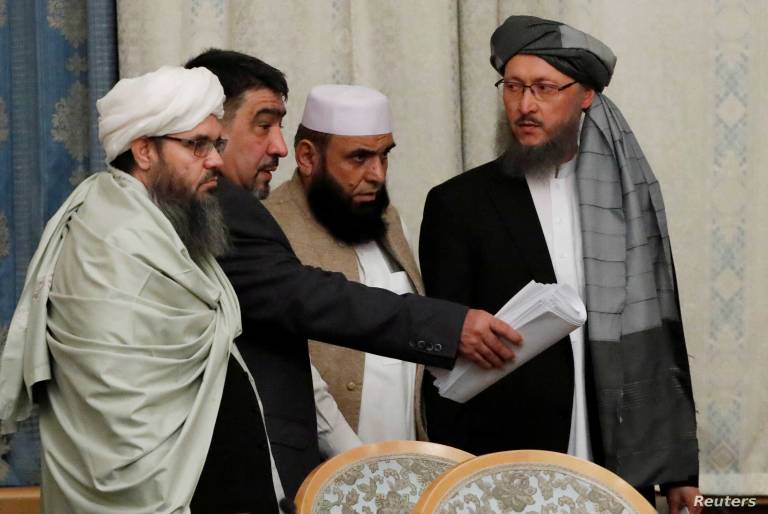Ahead of a likely intra-Afghan talks with the Taliban and amid intensified violence by the militants across the country, some Afghans have turned to social media, mainly on Twitter, and launched a campaign against compromises that are likely to be made in coming peace talks with the militant group. The campaigners are cynical, saying that they do not know exactly what has been dealt behind the curtain of US-Taliban peace agreement.
Under US-Taliban peace agreement, the two sides are bound to exchange prisoners. The Afghan government has released almost 4,400 Taliban prisoners and in return the Taliban have freed 845 government forces.
The campaign has made its way beyond Afghanistan with many Iranians joining the hashtag, while in the meantime, urging their own government to stop executions in Iran.
The social media users see recent compromises—made with in US-Taliban peace deal—as “ransoms” paid to the group. Their widely supported hashtag reads that “#stopappeasingtaliban”.
Voice of the victims
Civilians have paid the highest price over past two decades as the result of conflicts fought by the warring parties. Afghan civilians, including women and children, have lost their lives or parts of their bodies in Taliban suicide bombings, explosions, mortar attacks, and etc. Scores of them have been hit in direct firefighting between the warring parties, in airstrikes of the international forces and that of the Afghan Air Force.
According to a report issued by the Afghanistan Independent Human Rights Commission (AIHRC) on July 18, 170 civilians were killed and 272 others wounded as the result of direct attacks on prayers, religious scholars, and religious sites between October 17 of 2019 and July 13, 2020. According to preliminary findings by the UN Assistance Mission in Afghanistan (UNAMA), more than 800 civilians were killed and injured in deliberate attacks against civilians in the first six months of 2020.
Afghan war victims complain that they have no representation in intra-Afghan peace talks which is likely to take place in Doha in coming months. Contrary to that sphere, the twitter campaign is predominantly reflective of the victim’s voices. Portraits of the war victims and footages of the Taliban’s executions are circulated with critical comments and bitter memories from the Taliban era.
“Do not redeem the Taliban for the sake of the children who lost their feet to Taliban planted landmines,” said Fariba Qolizadeh, an Afghan journalist based in Iran, on her twitter account.
Posting photos of a man standing beside his then 10 years old son who was among the men massacred in 2000, Muzafar Ali said on his twitter account that he will never forget Taliban crimes. “Men were herded in an open field & riddled with bullets. Women brought d bodies to mosque & buried days later,” Ali recalled the incident story with pictures of the victims, the massacre site, and the mosque.
Since Friday, July 17, a picture of a teenage girl, 15, holding a Kalashnikov and a boy, 12—who are identified as siblings—has been widely shared on social media, mainly Facebook and twitter. In their hashtag campaign, the social media users applauded the teenagers for alleged killing of two Taliban militants and a local commander of the group in Tewra district of the central Ghor province. Talking to Kabul Now, district governor of Tewra confirmed the Taliban fatalities as the result of what he described as “retaliatory” action by the two teenagers who had lost their parents in Taliban attack a night before, on Thursday night, July 23.

Sher Mehryar, a Kabul based journalist, posted photo of a highly female educated girl who lost her life in a Taliban-claimed suicide bombing in Kabul killing at least 38 civilians and wounding dozens others in July 2017. “This is Najiba Bahar. She got her masters [degree] from Japan and was an employee of the ministry of mine [and petroleum]. She was a young girl who had just been engaged. Najiba was killed with her 30 colleagues, all civilians. The Taliban claimed responsibility [for the attack],” he further wrote. Mehryar added that all such crimes committed by the Taliban are now taken for granted. “These sacrifices must not be ignored,” he asserted.
Solidarity campaign between Iranians and Afghans
Some Iranians have also joined together in a twitter storm sharing the hashtag #DoNotExecute to protest the death sentences of three men who were arrested last years for having hands in staging nationwide protests against the Iranian government. Simultaneity of the campaigns have created a rare solidarity among ordinary Afghans and Iranians to support one another against almost two ideological hardliners in Afghanistan and Iran, with the first on the brink of taking the power and the later ruling with strict Islamic laws for decades in Iran.

Addressing the people of Afghanistan, an Iranian citizen with a fake account on twitter, Esrafil, asked the Afghan people not to make compromises against the Taliban. “Do not pay ransom to the Taliban, otherwise the future youth of Afghanistan will be as miserable as the youth of Iran,” the Iranian citizen said.
Sharing the hashtags #DoDotRedeemTaliban and #DoNotExecute, Amireshun tweeted that “Here in Iran and Afghanistan we are fighting same thing, corrupted ideology, but with different hashtags.” He further called on the people around the world to join Iranians and Afghans in their campaigns.
As a sign of expressing their dislikes, some Iranians have shared a single portrait illustrated with half face of Ali Khamenei, the supreme leader of Iran, and half face of the Taliban leader, Mullah Haibatullah Akhundzada.
“Do not redeem the Taliban because the Taliban and Islamic Republic [of Iran] are twins,” said an Iranian citizen, Qalamfarsa, on her twitter. She further went on to describe leaders of the Islamic Republic and the Taliban as “Butchers wearing turbans” while sharing the single picture of Khamenei and Akhundzada.




